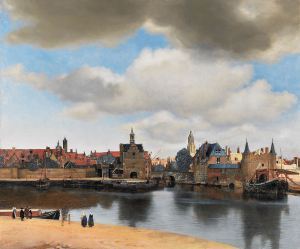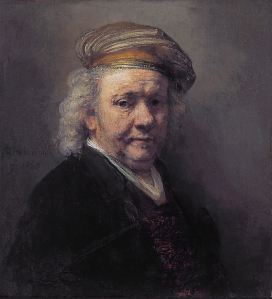Fran Macilvey's Blog, page 57
September 26, 2014
Bernie Leslie
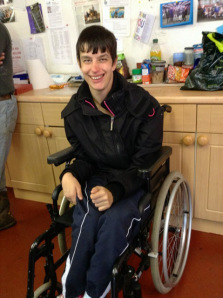
Bernie Leslie
Today I am pleased to feature Bernadette Leslie. Bernie is a Scottish writer who was born with Cerebral Palsy. She’s an ex-Parasports athlete who represented Scotland and Great Britain, winning a bronze medal with GB in the 2006 Boccia World Championships. She’s writing her first novel. In her spare time, she loves going to see her favourite football team play and loves animals.
In her blog, ‘The Wheel Perspective’, Bernie shares news and insights of her life. She is a passionate supporter of ‘Riding for the Disabled’ with whom she rides regularly.
Welcome, Bernie, and thanks for featuring today. I know that we will be sharing more posts, but, first, I would be really interested to learn about your experiences with Equus. How did you became so interested and involved with horses and their language?
It all started with my mum actually! A year ago, she read an article in the September 2013 issue of Oprah and when she finished reading it, she came through and she said: “There is an incredible article about horses this month and I think you would love to read it.” Somehow it struck a chord with me. Martha Beck, a life coach, was describing the Equus experience of a client who worked with Koelle Simpson, equine trainer/life coach, to resolve the issues that were plaguing her.
Strangely enough, the very next day, Mum and I were visiting some relatives’ graves. Now there had always been a horse in the next field, and I’d always wanted to say hello, but never could because it’d mean my electric wheelchair would be trudging through grass and leaving a right mess everywhere, not to mention getting stuck if it’d been raining.
I need to give kudos to the local council for this one because I noticed they had made a path up to the fence and I decided to see if the horse would come over. Thankfully she did and it was really through her that I began to see for myself just how horses perceive not only ourselves, but how we feel too. That started a journey of discovering everything I could find out about horses!
What teaches you about spiritual truths?
Equus is a non-verbal language of horses in which these amazing animals — so sensitive that they feel the tiniest of things landing on them — let us human beings know how they’re feeling via their body language, which is interesting, because thousands of years ago, our ancestors were known to communicate through body language, until other forms of languages developed and took its place — the ones we know today as written and spoken languages.
Spiritually, Equus has been invaluable to me. I was starting to figure out, through being with horses, that negative influences were having far too much influence over what I was doing. I felt under increasing pressure, and forgot about how important it was to take care of myself and return myself to a blissful, peaceful place. Equus teaches me what leadership really means and how to remain centred when others try to drag you down.
Horses have helped me do this and now I feel more confident that I am taking the right path — horses and writing are a winning combination, for me at least!
Thanks so much, Bernie. It is so interesting to discover that horses have a language and that we can learn to communicate with them through it. All the best with your writing and your riding!


September 24, 2014
John Bayliss -‘A Fist Full of Seaweed’

John Bayliss
Today I am delighted to introduce John Bayliss. A veteran of many writers’ groups and creative writing courses, he’s tried his hand at historical fiction, science fiction and fantasy and now he’s having a stab at crime fiction with a comic twist. He currently works as a technical writer in the electronics industry; and when not writing he’s taking photographs of wild places. John lives in a seaside town in the West Country and still can’t get over how close he is to the beach.
Hello John, I am so delighted to welcome you today, following the release of your second novel by Grey Cells Press featuring the lovable and hapless detective Springer in ‘A Fistful of Seaweed’.
How do you manage to combine working in a job, writing so prolifically and maintaining an on-line presence?
Thank you for inviting me. The secret is that both of the books I have published to date were actually written quite a while ago – something like five or ten years ago. They did need a rewrite before publication, but the main story and all the characters were in place, so the rewrite wasn’t too difficult and didn’t take too long. I have a third Springer book standing by that I wrote five or so years ago – that one will need little more than a ‘polish’ to get it finished – and a fourth book that’s not quite ready yet but will probably only take a month or two to finish. That means, at my current rate of publishing one book a year, it will still take me a while to catch up on the ‘backlog’.
Without giving away any secrets, can you give us any hints about what happens to Springer in future novels?
It’s very hard to say without giving anything away! One of his future clients is an escaped convict and he will also get mixed up in some dodgy dealings involving an Indian Restaurant. I also have the embryo of an idea that involves a variety ‘Summer Season’ at one of Westerby’s theatres, so Springer might eventually get mixed up with the world of show business, too.
My intention is that Springer will get gradually better and better as a detective with each new book. I want to reach a point where even Detective Inspector Willis realises his potential and their relationship becomes more of a partnership.
When are you going to finish the book provisionally called ‘Serpentine’? I think it is brilliant.
Serpentine is a story where I had an interesting situation and some intriguing characters but no real plot. I starting writing it anyway, in the hope that a suitable story would arise of its own accord, but unfortunately it didn’t, and to be honest, I am completely stuck as to what to do with it. I do like the characters and I hope to finish it one day, but at the moment I don’t have the time to concentrate on it. Perhaps what I need is a big publisher to offer me a big advance and force me to sit down for a year to finish it. That would be the motivation I need!
What is the secret of your Zen-like detachment?
Ha-ha! I have to tell you that it doesn’t seem terribly Zen-like from where I am sitting. I might give that impression because I am rather shy, and so tend to stay out of arguments.
What is your greatest unfulfilled ambition?
I have lots of little unfulfilled ambitions, but no ‘greatest’ as such. To be able to live off of my income from writing would be a nice achievement, although I am a long way from that yet. To walk past Waterstones and see a book I had written on display in the window – that would be another one. Another ambition is to be asked to write an episode of Doctor Who: I think that would be fun!
Do you believe in angels?
I’m afraid not. I realise there are still many things in the universe we cannot explain, but I think all these things will eventually have perfectly rational explanations.
If you could travel in time, where would you go?
The nineteen-sixties. Not only would it help me enormously with researching the Springer novels, but it would be fun to find out if that decade really was as ‘swinging’ as it is claimed. To be in The Cavern Club when the Beatles were playing, or at Wembley for the World Cup Final or being at Cape Canaveral to watch the launch of Apollo 11. Those would be experiences worth having!
Any tips for maintaining creative writing?
A little bit of serendipity: whilst pondering this question I came across a quotation from George Orwell: Good novels are written by people who are not frightened. I ’m almost tempted to make that my personal motto.
Other than that, my best tips are practice, practice, practice. And read, read, read.
And did I mention practice?
Can you tell us about your first big break into publishing?
A friend of mine on the ‘Authonomy’ writer’s website told me that her editor, Robert Peett, was starting his own publishing company. She had already read the first Springer novel, ‘Five and a Half Tons’, and thought it would be something that Robert would be interested in for his new crime and mystery imprint, Grey Cells Press. So I sent off a query, and it turned out it was exactly the sort of thing he was looking for. Almost immediately I received a request for the full manuscript and soon after that received an offer to publish the book.
What do you think are the secrets of success?
Luck has to come into it, I think. One lucky break can make all the difference. However, a person needs to make their own luck: there was a famous sportsman who once said: ‘It’s funny, but the more I practice, the luckier I get.’
I think the same goes for writers.

‘A Fistful of Seaweed’ by John Bayliss


September 22, 2014
Creature Comforts, or, the Danger of Distractions
I’ve got to be careful to do what I decide. I make lists, and at my bedside, I make promises to get round to this or that unfinished project. Yes, I really must get on…and in the midst of that, there are meals to prepare, exercise to do, fresh air to relish and people to be kind to. I love all that. I adore social media, blogging, looking at Wikimedia Commons and generally browsing through my day. I also still play the occasional game of mah jong….and so it goes.
Often, I sit uncomfortably and am not really working, though. Remembering to check lots of websites and maybe drop in on my Twitter account is distracting, and evades the truth that I really would just love to get on: I want to write a series of blog posts; I would like to read and review that book; I would love to sit for an hour’s silent meditation; I would enjoy writing my next article, and actually have the courage to finish it (!) and send it away (!!!); and there is a book outline just waiting to be written up.
Distractions are delightful, sometimes. But I know that the edgy, dissatisfied frippery of a wasted wet morning is not productive and should be avoided. As the days pass, that kind of waste is unlikely to achieve very much, and ultimately can ruin my more meaningful ambitions. Real, deep rest, genuine laughter, a delicious meal, the nourishment of a good book and strenuous exercise or a challenge set to and completed – all these are very worthwhile. I can achieve these by first doing what I would most enjoy, then do the next thing I most enjoy, and then the next…. Why do we resist our happiness?
I went away for two nights. I needed a rest, admitted it, and organised it. In the end, it was very easy to do, and a truly lovely space away from the usual frameworks I have become beholden to. I assume these are inevitable and become lethargic behind them. With some space and time to do nothing, I rested well and wrote a bit. Two days of real rest were most productive and helpful. Compare that with deciding that, ‘Well, I won’t go away because I have too much to do and it costs and I am supposed to stay home….’ I specialise in these kinds of mental disagreements but, they achieve very little.
We can rest, properly, which is deliciously refreshing and gets us a step further down the right road. We can laugh properly, which lifts us up. We can set down and write properly, which is satisfying, fulfilling and peaceful, and carries us a few more steps along the road. So, we stop wasting time skimming the surface and making excuses for a sort of half-baked laziness. How wonderful to have the courage to do what we most enjoy. How delightful to learn that living in discipline with our true intentions
is productive, energising and helps us towards our next goal, steadying our hand and determination for the next challenge.

Skydive, Miami


September 17, 2014
I don’t know what I want to do with my life
Sometimes, I feel a bit like Julia Roberts in ‘Runaway Bride’. If you never saw that movie, or if you hardly remember it – and I don’t either – it is about a woman who keeps going to get married and keeps running away because she doesn’t really know who she is, and feels really uncomfortable marrying some lovely guy under false pretences, so she would rather leave them at the altar than be dishonest.
I’m like a chameleon. Having garnered a small amount of confidence only recently, and mostly in my role as wife and mother, I find myself bowing first this way, then that, depending on what people say about my writing. About anything, come to that. I live in hope that soon, sharp opinions and criticism will pass me by (Lord, don’t you know my intentions are good, please don’t let me be misunderstood….) and I have stopped expressing these very often, because I know what happens when I do that. God, it hurts. I sincerely wish to centre myself more solidly, and hope that this will come with time and experience.
I hope that I can soon stand up straight and say, like Clark Gable, Hey, honey, I love you, but frankly, my dear, I don’t GIVE a damn, with the emphasis in all the wrong places and not GIVE a damn…
I know that when we are enjoying our lives, living confidently in our skin, we come closest to living as we are supposed to, and that life tends to conspire gently in that, so long as we have the courage to make the break from fearful thinking, from expectations, wanting and needing.
It occurred to me that I should not scan my emails first, every day. I am safe here and have no need to be on the lookout for danger, predators or difficulty. That behaviour sets up a reactive life, which is inherently uncertain. It would be better to do first what I most wish to do, and allow the rest to take care of itself. I met a man who was comfortable in his own skin, this morning. And I thought, now, his is an example I can follow.

Lotus flower


September 11, 2014
Visit to the Doctor
Rarely, if ever, do I visit my doctor’s surgery on my own account. I have found an accommodation with myself that works well, most of the time, and I know that as I get older I am finally learning to listen quietly, to suspend judgement and to live in the moment more fully. Problem is, I had a vivid dream, the meaning of which was clear, to me, at least. I have always had lots of car dreams: a car, in various states of repair, indicates my physical life and concerns. Small careering fast downhill with no steering wheel….that sort of thing.
So, a shiny, green car in good condition. Green = health, and there is lots of that. But open the passenger door, and under all green health, you can see that the hinge, the lynch pin, is rusted right away, and that the door is only just hanging on. I took this as a warning, that one of my joints needs attention, and made an appointment to ask for a referral to X ray. But my darling GP, whom I have not seen for six years, is unwilling to expose me to any more X rays than is absolutely essential – and I would agree with her, normally – so she gently declined my request, tested my joints and told me there was no sign of any damage that would either show up on an X ray, or affect my range of movement significantly.
She said she would request a referral to physiotherapy and OT, for an assessment, to see if they can make any recommendations. The problem is, as anyone who has read ‘Trapped: My Life With Cerebral Palsy’ will know, I have an insane and quite unreasonable detestation of ‘assessments’ by medical professionals. The very idea is upsetting and I fear that if I go I shall be defensive and upset and probably burst out crying. I need my privacy. Surprisingly, the fact that I have CP appears no-where on my GP notes, but has been documented elsewhere extensively, so while my GP is entirely oblivious of my emotional fragility on the matter, I cannot explain. In this particular instance, I would have preferred a referral. I could hardly sit there and say, “Well, my angels sent me a dream, which means….” So, I am no further forward, except, perhaps, that now I am certain that I should probably go swimming every single day for the rest of my life.
Conclusion 1: Wild Horses will not drag me to any assessment.
Conclusion 2 – I am more or less back to square 1.
Conclusion 3 – I shall need to start taking more care of myself.
Conclusion 4 – So, no change there, then.
I have been swimming this morning and yesterday, so we are making progress. Maybe that is what Spirit were trying to tell me – get moving, girl! Look after yourself. So I shall be cheerful and hope for a miracle. In the meantime, does anyone have any other suggestions?


September 8, 2014
Reviewing Books
It has never occurred to me before, in any way that I could explain, at any rate, that how we feel when we are reading a book, is different from the way we may feel about the same book, when we are reviewing it. I may be totally engrossed in a narrative, and yet, when I review a book, I might comment on the social context, the narrative flow, whether the characters are plausible and so on.
I asked my husband if this was legitimate. Would it be acceptable, for example, to be totally taken up with a story, and yet, on review, discount that feeling and focus on more general issues? He said that was entirely to be expected; and indeed, I suppose that is what it means to review a book. We read, then we stand back and take another look.
I have read several of the ‘Jack Reacher’ books, – I tend to blitz on one author at a time – and while I was reading them, I have found myself totally caught in them. That they began to see them as rather two dimensional and, as the series progresses, increasingly violent and morally debatable, are issue that at first did not really get a look in. I was more intrigued with Child’s use of language and short sentences….It was only after having read a solid handful and noticing the increasing violence and the oddly dubious moral distinctions, that I finally decided to stop reading them. Distaste came slowly, when I saw patterns emerging. Pick up a Reacher book, and I have to admire the hook on almost every page…..In a review, I would mention that they are compulsively readable, but would want to focus more on my reasons for refusing to read any more of them.
It works both ways, of course. I have read lots of chic lit, and know by now which authors are most likely to tick my boxes, but have to be careful not to make too many assumptions. Reflecting on how much I would have missed if I had simply hiccupped at the occasional grammar flub in my latest read before putting it away unread – ‘actually, this is really amusing and she has the flavour just right’ – reminds me that sometimes, persistence pays off.
Should we focus on how we feel when we are reading and enjoy getting carried away by the action? Or are we right to offer a more reflective opinion? Compulsion is what sells books, but are reviewers right to focus on other issues?

Henry Morland – Woman Reading By A Paper Bell Shade


September 3, 2014
Who Takes The Train?
Being bussed over the border from Belgium into Holland, I had occasion to notice my fellow passengers: young men with buds in their ears, tapping feet or drumming fingers to the beat of their music; mothers with infants on their laps; single girls on summer exchanges; grandparents visiting; young, casually dressed fathers overseeing their growing families.
No middle aged executives anywhere. No businessmen, or higher-paid civil servants who, I assumed, would have been driving home in their cars on that balmy Sunday evening. Car ownership is one badge of success that we all aspire to, though the image projected
is often grander than the reality – we, for example, appear to have two cars, but both are actually leased, one through my husband’s workplace scheme, and the other through a government funded programmed designed to allow me freedom to travel.
Is taking the bus a sign of independence, physical fitness, sociability, freedom, poverty or environmental awareness? Is car driving emblematic of maturity, liberty, the success of the alpha male in a capitalist economy, or merely the resort of isolated and depressed over achievers? The different transport networks all have their uses, though I could not help reflecting that most of my travelling companions would have preferred a neat car to take them home. Money, or a shortness of it, was probably what motivated them to choose train travel.
Women with kids should have cars, to help them get around more easily. Alpha males should take the bus to work, to set a good example, and offset the carbon footprint of their business travel accounts; and to share quality time with their kids, teaching them about the dangers of the road. Public transport which is properly networked and funded is a joy to use. With so many contradictions, it is little wonder that road and transport networks remain a difficult and contentious area. For each swing, there are a couple of roundabouts.
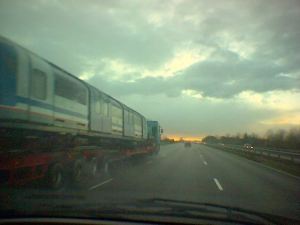
Waterloo & City Line Train travelling by road


September 1, 2014
Angels Singing In The Wires
Having hung around most of the day, hubby, daughter and I boarded our train from Belgium to Holland. We were greeted by the news that we would have to get out, just short of the border and from there be bussed over the border to the nearest available train station to resume our travels. Apparently the train would be unable to cross, since the points on this side of the border were not working or were incompatible with those on the other side. The outward leg of our journey into Belgium had gone without a hitch; and you would think that this problem, which sounded a fairly regular occurrence, would have been sorted by now. Whatever the reason, it meant that we were disgorged at a small border town, providing Sunday evening entertainment for a child and her father who hung out of the window of their flat under the roof. It was sporting a national flag. At the borders, I imagine that patriotism becomes more colourful. Not knowing how long we would have to stand and wait for a bus, hubby went to buy a bottle of water, and I calculated when would be the best time to share out our small packet of biscuits, the last of the snacks we had brought with us from Scotland.
Then, buses arrived singly or in pairs. The waiting passengers surged like the waves of the sea, as the more able and faster travellers got to the front, boarded buses under siege and left the rest of us waiting. It really made no difference where you might be in any queue. The only determining factor was how fast you could run. Mummies with babies in prams, pensioners, and the elderly were basically left to fend for themselves. Noticing this, eventually I gave up worrying and let a young mother and her baby in a pram on the bus ahead of me. It was a symbolic gesture, but somehow it mattered to me that she should receive some consideration, even if I was just a tourist passing through. Actually, not entirely a tourist; visiting family, who happen to live in two countries.
Finally, the crowds were catered for and the three of us managed to get on the same bus, which took us an hour’s drive over the border and to the next main station, where our train was quick in coming. I judged it a good time to share out the remains of the biscuits and sat back in my seat.
In among the jolts and metallic screeching, I heard singing; high pitched long notes, with pulses braking the sound fractionally, then resuming an inimitable line of music, yellow and orange harmonies beneath, blending: The sounds of the wires vibrating. Under taut wires, the train cruised the tracks. I knew we would be fine, and so it proved.
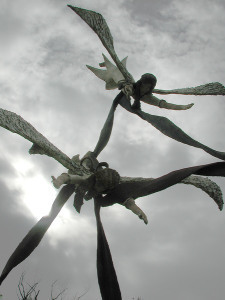
Flying Concrete Angels – Chrispackerstudio Kenny Hill, 200


August 28, 2014
Visit to the Mauritshuis Museum, The Hague
Among the pleasures in which I indulged over this Summer was a visit to the newly refurbished Mauritshuis Museum in the Hague, Holland.
We Brits would call it an art gallery, but our continental neighbours – and I am half Belgian – make no distinction between an art gallery and museum. The Mauritshuis is a delight. Beautifully proportioned to an intimate, human height, with a wide central staircase and elegant rooms for circulating, its architectural piece de resistance, imvho is the longer hall used, presumably for audiences with the prince, for dances, entertaining and fine dining. Despite the crowds this hall was entirely empty when I went in, so that I could spin unimpeded and delight in the carefully wrought period detail and neat, elegant proportions.
My favourite art discovery was the View of Delft by Vermeer
which manages to capture the intimacy of his portraits with a depth of detail and perspective which is truly breath-taking. There is also a velvety texture and intimate light and shading, which is so divine it simply made me want to cry. It was startling to be standing in the same room as this picture and to feel that its setting was so entirely appropriate.
All the pictures at the museum are in the public domain, and so can be viewed on public sites such as Wikimedia Commons. Yet, despite the faithfulness of the electronic images, they simply do not convey the depth and brilliance of the View of Delft, nor the thrill of being in a house, in a room, with so many famous faces,

Queen Jane Seymour, by Hans Holbein
all given their proper place and in context. Portraits of Rembrandt as a young artist
and as an old man
look out at the visitor; and cleverly observed artifices, such as fingers clasping ledges to make the sitter look as if he is in front of us
(‘Portrait of a Man’ by Sittow) fit so exactly in their place that history leaps to life. If ever there was an argument in favour of ‘the real thing’ as opposed to electronic, digitised equivalence, this is it.
The building itself backs out directly onto the canal. We can look out of the high shuttered windows at rain pelting down, and feel as if we have travelled back in time, to a select gathering of Prinz Maurits’ friends.
The best gallery I have been to, by far, not just because of the paintings, but because of the faithfulness and beauty of the setting. If you get a chance, go see.


August 25, 2014
Visiting Noss Cathedral
On this Autumnal day of clouds and rainbows, I cast my mind back to holidays in the Shetlands. This summer we enjoyed ten days of sea and sun, and while the family went exploring, I watched rigs of flowers rippling gently in their own patterned sea, sharp gusts reminding me that we were at far northern latitudes. Remembering Shetland’s grey cliffs and slightly forbidding aspect, this time I rejoiced to see so many trees, and Shetland’s verges lit with glimmers of sun, the grasses and lilies allowed to dance ragged at the edges. It was beautiful.
We went on a boat, on our annual pilgrimage around Noss National Nature Reserve, to the cliffs to see the gannet colony. As we drew nearer, solitary roving youngsters floated over the boat, the advance party giving no clue of the excitement ahead. The sandstone cliffs provide innumerable ledges, rising up 180 metres perpendicular to the sea. When the tide is calm, the boat motors right in to the cliffs, and bobbing in the water while gazing up at the ledges is a dizzying experience.
Numbers of nesting birds vary according to breeding success, which in itself depends on the availability of sand eels being found at certain depths in the water. The boat crew told us that while the numbers of gannets in the colony is something like ten thousand breeding pairs this year, numbers of kittiwakes have fallen dramatically, perhaps because of a shortage of larger fish, such as cod, which drive the sand eels to the surface, allowing kittiwakes to catch them at shallow depths. Not all birds can dive, though the cormorants, shags and guillemots are famous for it. Some birds feed within very narrow margins at the surface of that water, and may be struggling to find enough food to raise the next brood of youngsters. It is startling to reflect that we know so little.
Meantime, the noise and sheer exuberance of the large bird colonies makes me want to dance. But I put my hood up, to avoid the dropping guano.
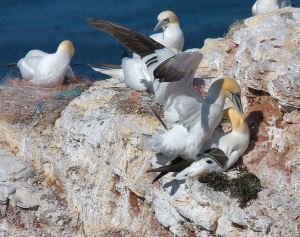
Northern Gannet Colony
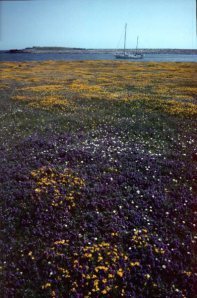
Grutness Voe, Shetland







